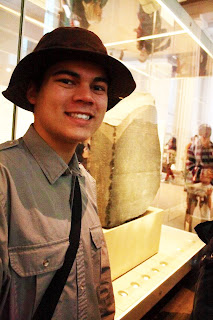The Following is a short essay that I wrote for an economics assignment based on two articles. The first, is written by Johnathan Leightner and entitled "Utility versus Self-Sacrificing Love". The second is called "The Neoclassical Model in a Post-Modern World" by John Lunn and Robin Klay. With a 350-word limit, I was unable to go into thorough detail, but that may make this essay more digestible for readers who don't have a large chunk of time to read. We were asked to respond to this prompt: what the main point in Leightner's article. How would Lunn and Klay respond based on their article?
Read More...
Leightner states that our economic
paradigm is to think that the ultimate aim of human beings is to achieve the
most utility that can be had given our available resources. He goes on to say
that this is an unchristian attitude towards life since God calls us to be not
concerned for ourselves (Matthew 6:34) but rather to invest our time and energy
in others (John 13:34-35). Furthermore,
he says that calling a person’s acts of self-sacrifice for others “utility
maximization”, does a disservice to the nature of love, which in its purest
form has no orientation towards itself. As
is often the case, when refuting the doctrine of utility maximization,
Leightner cites the life of Mother Teresa: someone who lived as righteous of a
life as any. How could we say that she
was acting only in her self-interest to maximize her utility in life while
feeding orphans and treating deadly diseases?
Klay and Lunn would respond to this
indictment by saying that utility maximization is not the single driving force
behind every single action in a human being’s life. Rather, they say, economists think on the
margin: making decisions based on circumstances influencing an individual at a
particular moment: will it rain? How can I treat my headache? Now given the fact that it may or may not
rain, do I bring an umbrella or not? Given
the fact that I have a headache, do I treat it with one medicine or the
other? All the situations faced by a
person in a day, or in a lifetime, have a multitude of possible responses. In light of that, a person must be able to
choose what actions are best for him. The
heart of utility maximization it is not about being selfish, but rather about
being smart. This utility model does not
take into account every aspect of a human being’s lifestyle, nor should it
since it is only a model. (Think of a
model airplane, which can tell you a lot about an airplane, but cannot itself
carry passengers across the world.) Rather,
it simply explains how a rational individual will make decisions as
circumstances present themselves.
For anyone keeping track, that was just over 350 words. But I added a sentence here for clarity that was not necessary in the essay I'll be submitting, which is under 350.


